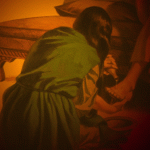There are confronting things in today’s gospel; paradox and uncertainty. Mary of Bethany bowls us over with her extravagant gift, worth a year’s wages; but then comes the disturbingly understandable portrait of Judas; miserable and bitter. And finally Jesus’ words—so easily misinterpreted— about the poor being always with us; where do we turn?
I think to find where John is leading us, we first have to acknowledge that this gospel works at a number of levels. I’ve often said that John is a very sensory gospel—there’s lots of tasting and smelling and things in John. But often, if John says see or hear, it’s not only physical seeing and hearing that’s intended, but spiritual awakening and insight as well.

Take Mary’s gift of nard to Jesus. It’s strangely given; not given to keep and use; it’s squandered on Jesus’ feet. It’s given to everyone there in its perfume, but no-one will ever be able to use it again. It’s given as though there’s no tomorrow. What’s she saying? Where’s she taking us?
Earlier in the Gospel, we heard Mary’s sister Martha say who Jesus really was. Now Mary says it too. But she says much more: she also says what will happen now he’s come to Jerusalem; he’ll be killed. Martha told Jesus privately that he was the Messiah/anointed one.(11.27) Today, Mary proclaims it publicly and physically when she anoints Jesus. And there’s more; she also invokes the type of anointing that has to do with the dead. She does what we do when we know the death of a loved one is near. Before they die, we do everything we can to let them know we love them; to tell them who they are to us.
She knows where he’s heading, and yet she doesn’t try to stop him. I think of the children watering the wheat today as being very similar to Mary’s anointing of Jesus for his burial. They’re wasting it if we think of it as food; and that’s how we could see what Mary did with the perfume, if you think of it like Judas did. But for us, the wasted wheat and perfume are signs of hope for a new, life-giving life; signs that God’s abundance allows for death, but it also inspires us to look for resurrection to a new, wonderful life again.
So Mary’s gesture isn’t just extravagant; it’s prophetic, it’s a proclamation of who Jesus is—God’s anointed one—the one God’s people had looked for for a thousand years or more. It’s also a well-wishing; ‘Godspeed the feet of the one embarking on this perilous journey.’ It’s a sign—the last in John’s book of signs before Jesus’ entry into Jerusalem on Palm Sunday.
Why can’t Judas be like Mary of Bethany? For that matter, why can’t all Jesus’ followers pour ourselves out like she did? Maybe like Judas, people struggle to come to terms with a God whose extravagance is so great that it blocks out even the terror of death—never mind tomorrow’s grocery bill. Poor Judas is trapped in the pragmatic world—one where you make sure you’re prepared for things—even to the point of dishonesty; where you keep enough fuel in the tank for emergencies; where you scrimp and save when you can, because you’re afraid of what’s round the corner.
Even though he’s one of Jesus’ disciples, somehow Judas can’t see who Jesus is the way Mary and Martha can. Surely there are good reasons for his mixed fear and zeal. But Judas tells us for sure that our convictions and our ethics can’t be the engine or the foundation of our faith. That only comes from discovering who Jesus really is.
That’s what Paul was saying in the epistle reading today. You could read Paul in a way that makes you think he’s driven by remorse for what he once was. But that’s not what he’s saying. Paul senses that Jesus has claimed him as his own, and he’s stunned with gratitude. So every bit of energy Paul expends; every struggle is because of Jesus’ grace to him. He’s not looking behind; he’s looking forward, ‘…driven by his own personal experience of grace; pure, unexpected, unearned, outrageous grace.’(Phil 3.14)
Outrageous grace demands an extravagant response; that’s just what Mary did; that’s Paul’s journey. But Judas, poor soul, couldn’t see the grace. And I’m sure he’s not alone. We all need more Marys of Bethany to tell us that the fear and suffering and misery of this world are not the defining realities of being. It’s so healing when we meet these reckless givers! They transform our world. The world needs more people to give confrontingly.
Our giving to the poor and needy, our prayers for the sick, the sad and the unloved; for those burdened with responsibilities they may have deliberately sought but which eat them alive—these, our gifts and prayers are strange if we think of them as inputs for which we expect outcomes.
But they make perfect sense when they are seen for what they really are; a response to the Jesus who has met us, has called us, who has shown us the way of self-giving, joyful abundant extravagance. We are to bless the world with a model of infectious extravagance that bubbles out of our thanks for God’s grace to us. To whom be glory and praise. Amen
